Degenerated: An Oral History of Airheads
The post Degenerated: An Oral History of Airheads appeared first on Consequence of Sound.
Tell us if you’ve heard of this one: Three aspiring rockers break into a Los Angeles radio station with water guns. Their demands? They want their demo on the air. The three in question? Brendan Fraser, Steve Buscemi, and Adam Sandler.
Along for the ride is Michael McKean, Joe Mantegna, Ernie Hudson, David Arquette, Michael Richards, and Chris Farley. On paper, this reads like a blockbuster cast. Yet in 1994, Airheads couldn’t even make back half of its $11 million budget.
Two weeks after its opening, Airheads was pulled from theaters and rendered a flop. Not long after, Comedy Central began running the film on a continuous loop, the film’s stars became Hollywood fixtures, and a cult following emerged.
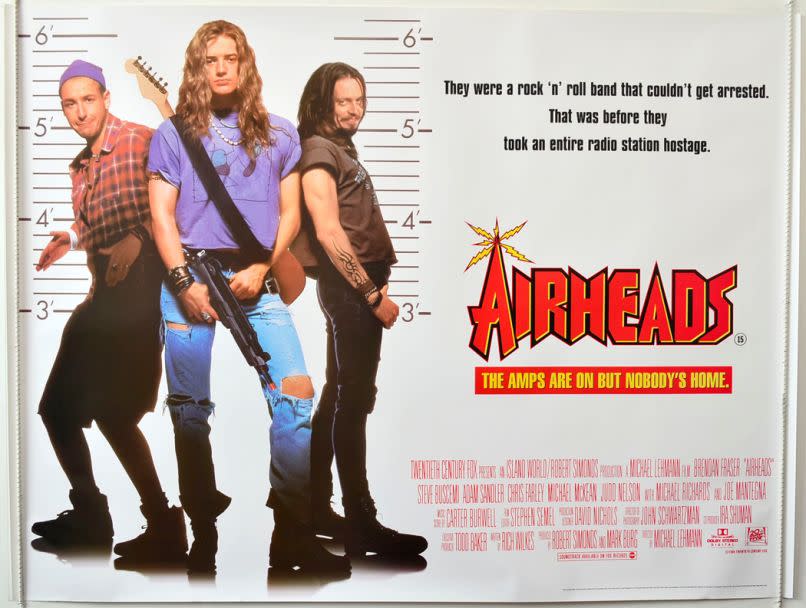
Airheads Movie Poster
This year, in celebration of its 25th anniversary, Airheads closed out Cinepocalypse Film Festival, The Lone Rangers burger debuted at Kuma’s Corner in Chicago, and a high school in Canada even mounted a stage version of the film. How’s that for a “flop”?
Today, we look back on a time when real life didn’t matter, every challenge was simply an obstacle to overcome in order to have your voice heard, and all that mattered was the music, the look, and the great debate of who would win in a fight: Lemmy or God.
Ahead, you’ll hear the entire story of Airheads as told by the cast and crew, specifically Fraser, Mantegna, McKean, Marshall Bell, Amy Locane, Michelle Hurst, Nina Siemaszko, screenwriter Rich Wilkes, director Michael Lehmann, Island Pictures executive VP Todd Baker, 20th Century Fox executive Michael London, and 20th Century Fox president of worldwide production Tom Jacobson.
And if it’s too loud, well, you’re too old…
RICH WILKES (SCREENWRITER): I had always loved Dog Day Afternoon. One day it occurred to me, if you did a comedic version of that set up and put it in the world of rock and roll and how do you break through into the music biz, it sort of lends itself to that structure.
I was doing music journalism and interviewing bands. I’d always been into music and played music. And when interviewing bands, you really got some perspective on how difficult it is to make a living playing the music you love.
So I wrote it on spec and it was acquired by Island Pictures. And then once interest started rising in the movie, and people around town were talking about it, they weren’t willing to put the money in to make it right so they sold it off to Fox and stayed attached as producers.
TODD BAKER (EXECUTIVE VICE PRESIDENT AT ISLAND PICTURES): I was very friendly with Rich’s agents at the time, and they sent me the script, which was probably an overnight read. I don’t remember what we paid for it but we made an offer on the script and ended up buying it. And 20th Century Fox liked it and wanted to do it.

From there, the script was brought into 20th Century Fox by Island Pictures, where it was pitched it to Michael London.
MICHAEL LONDON (EXECUTIVE AT 20TH CENTURY FOX): I remember that Island had shown it to me, and I got super excited about it really fast. I vividly remember trying to get Peter Chernin [Chairman of 20th Century Fox] on board. Tom Jacobson was the head of production, but Peter made the decisions. Peter was the green light guy. And I remember how excited I was when Peter read it and said, “This is fantastic. I love this.” Because it was an unusual piece of material. It was about a heavy metal band, which people thought was kind of silly, and it was a movie about these young characters and taking a radio station hostage, which was pretty edgy in those days.
TOM JACOBSON (PRESIDENT OF WORLDWIDE PRODUCTION AT 20TH CENTURY FOX): We were looking for comedies at the time, and it was a fantastic script. It was really funny. The idea was out there and rebellious while also sort of mainstream at the same time.
MICHAEL LEHMANN (DIRECTOR): Michael London had read the script, and I guess he developed the project with producer Bob Simonds. Michael thought it would be good for me because he knew I was a music fan, and he thought the humor was right for me. So he contacted me directly and said, “I have a script in development here at Fox that I think you’d like.”
I remember thinking first and foremost that it was funny and clever, and that it was a take on the rock and roll mentality that was both celebratory and also kind of reasonably, darkly funny. My only question was, “If it’s made at Fox, will it be too commercial?” Will it be too watered down? Is there a way to make this movie be as authentic to rebel rock and roll spirit as it could be, while at the same time it’s sort of having fun with the idea of naively rebellious rock and rollers?
WILKES: Michael Lehmann, as far as I remember, was the first choice and was one of my heroes because of Heathers. So, it was amazing to get him on board and he’s also a big music guy going all the way back to when he was like 12 years old and sneaking off to see Jimi Hendrix.
LEHMANN: The funny part for me was that particular generation of rock and roll was a little bit younger than me. I wasn’t a big Guns N’ Roses fan. I was a little bit more early punk, garage band, a little bit of Seattle grunge was still in my soul, but it was mostly earlier stuff. I grew up with psychedelic rock and roll in San Francisco, which was where I really got exposed to a lot of rock.
But I was in New York in the mid-70’s and living in the East Village. So, for me in a way, part of the fun of reading the script was that it was about a generation of rock and roll that wasn’t mine and I got a kick out of. And so partly I thought, This would be a great way to familiarize myself, in greater depth, with the trends in rock and roll that weren’t my favorite.
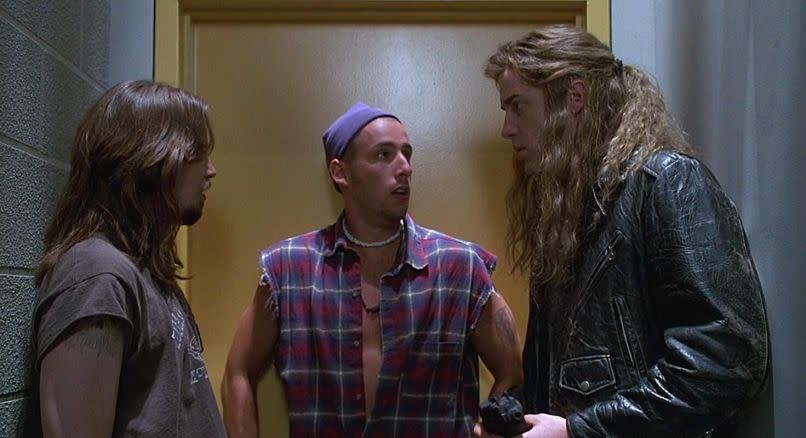
Airheads (20th Century Fox)
With Lehmann on board, next up was the casting process, and nearly everybody in Hollywood was considered. John Cusack, Bill Murray, Winona Ryder, Malcolm McDowell, Peter Weller, Chris Rock, Richard Lewis, John Corbett, and even a theater actor named Kevin Spacey, who flat-out told Michael Lehmann, “You’d be crazy not to cast me.” Perhaps this version of Airheads exists in some bizarre-o parallel universe.
LEHMANN: My feeling was that I had never done something like this. I was a young filmmaker. I had done a couple of independent movies that were really liked and out of the mainstream. And then I did Hudson Hawk, where definitely the sensibility was a little out of the mainstream and it didn’t play that well out of the mainstream. But I still hadn’t learned my lesson, thankfully, and I thought, I’m going to get people in this movie that you wouldn’t expect to see in a movie like this and that’s going to make it more like something I want to see.
BRENDAN FRASER (“CHAZZ”): I was actually in Chicago when I first received the script, while I was shooting the movie With Honors. And Michael Lehmann had sent the script and I think made a trip out to visit me and say very nice things to me. I was very flattered that this proper director had come all this way to say, “Hey I think you should do this.” So that was good. And I had the living-in-L.A.-out-of-your-truck-and-apartment routine down, but I was no musician. And he’s like, “That’s okay. None of those guys are either.”
WILKES: Brendan was just catching on. I believe it was surreal for him to see his face on a movie poster and be considered a kind of leading man. So it was catching him at a time when he was still getting used to the idea of being a movie star.
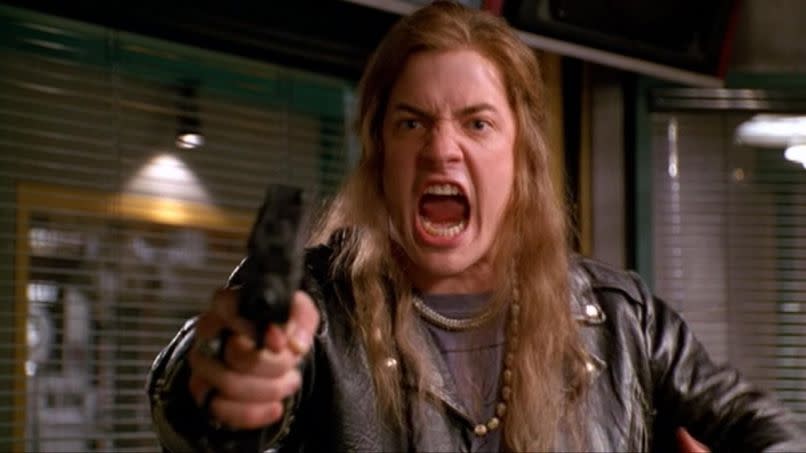
Airheads (20th Century Fox)
LEHMANN: [Adam] Sandler hadn’t proven himself in movies at all. I kind of remember that people were divided about him. The funny thing about Sandler’s humor is it’s this weird combination of way off center and way juvenile, and he sort of built that. And when he was building that style, a lot of people in the mainstream didn’t really get it. And so it was a battle. They didn’t say no. But Fox’s attitude was, “We need to know that he can do this kind of thing.”
JACOBSON: Rich reminded me, which I forgot, that Adam wanted to play the lead. And whomever at the studio thought, Well, he’s not ready yet. This is really his first movie.
BAKER: His then-younger agents at CAA, who are super powerful now, great guys, and they’re really trying to get him into a movie. A good movie. A comedy that he would flourish in. And I remember them being all over us: “You’ve got to cast Adam Sandler.” He wasn’t the big star yet. He was great for the role, but I don’t think he was paid more than $50,000 for that. And I just remember his agent, Adam Bennett, saying, “What about Adam Sandler? What about Adam Sandler? Come on, Todd. What about Adam Sandler? We’ve got to get this role for Adam Sandler.”
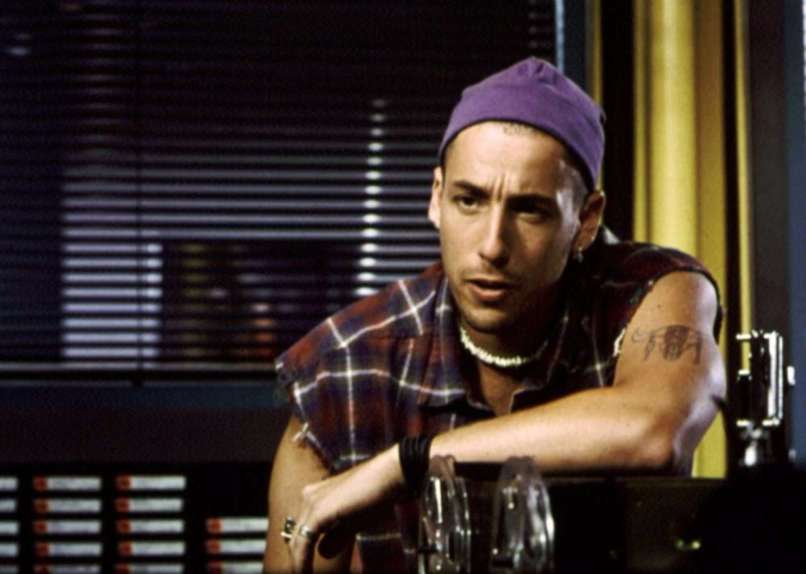
Airheads (20th Century Fox)
LEHMANN: And Steve [Buscemi] had done independent films, and he was known in the independent world as a really good New York actor, and kind of quirky and odd. I had seen his work in a film called Twenty Bucks that a friend of mine had directed, Keva Rosenfeld. I thought, You know, this guy, we always see him in these edgy indie film kind of roles, but he’s very funny. I just thought the guy is so funny and I felt that he could live in a slightly more mainstream comedy and kind of surprise people.
The harder part was convincing the studio to cast him because, in that world, they were kind of afraid of him.
JACOBSON: There probably was some pushback going, “Well, Steve Buscemi’s a really good actor and he does darkly humorous stuff.” He had done some Coen Brothers movies, but he hadn’t done Fargo yet. “But does he say comedy?”
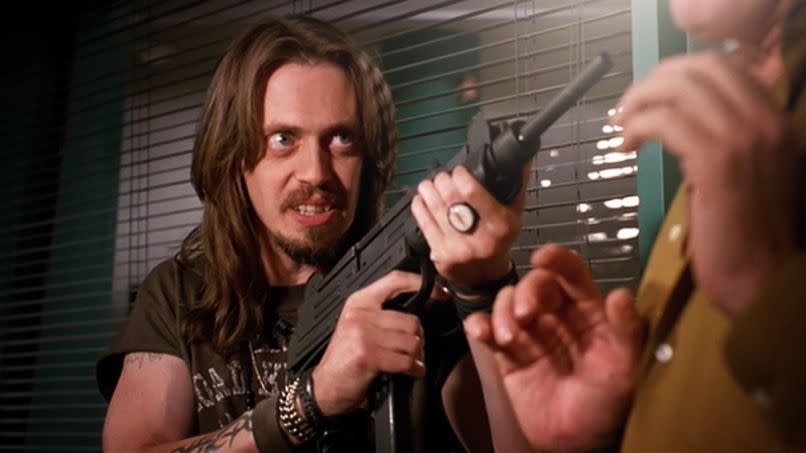
Airheads (20th Century Fox)
LEHMANN: I also had a very hard time getting Joe Mantegna approved. When I said, “Joe Mantegna,” they looked at me like, “What??” Because Joe had been doing serious dramas. I don’t think he had been seen doing any kind of comedies. He wasn’t a rock and roller. But I thought he was such a good actor. I had seen his work in dramas and thought, This guy is such a good actor. I’ll bet he could do some great stuff with the role. And I feel he did. He grounded it and he was really funny and very dry.
JOE MANTEGNA (“IAN”): It’s funny. During that period, I was doing back-to-back comedies, because the next film I did was Baby’s Day Out. I never knew what was gonna come across my desk. And I remember when Michael Lehmann contacted me, it was one of those things where he just felt I was the guy he wanted for this role.
LEHMANN: He told me he had kind of a rock and roll past and he was really into music when he was younger. And he pointed to an ad for a guitar amplifier for some obscure guitar amp named Condor. The ads used to run in guitar magazines and rock and roll magazines and I knew the ad. And it was just a picture of a guy with long, dark hair. And he said, “That’s me. That’s when I was younger.” I always thought that the ad looked ridiculous so when I found out that was Joe, I thought, I really have to cast him.
MANTEGNA: I wanted to do research on it. So we contacted KROQ here in Los Angeles, and one of their main disc jockies at the time was this guy called Jed the Fish. He was very well known in the rock and roll community here and agreed for me to sit in with him for a couple of days. Just be a fly on the wall. I don’t know if he even acknowledged I was there, which was fine. I wasn’t there to be interviewed. I was there to just kind of observe what it was like to be a rock and roll D.J.
MICHAEL MCKEAN (“MILO”): My manager said, “They want to see you for this movie. Go in and read this part.” So, I went in and I don’t even think I read a scene. But I met everybody and liked everybody. And I brought with me a plastic bag that contained a pony tail that I had actually grown and had cut off a few weeks before, and had decided to hang onto it for some reason. So I brought them a ponytail and said, “If you give me the part I could use this ponytail.” And they seemed amused. So Michael hired me and everybody seemed to be on board with it. They thought I could be this pretentious, backstabbing, ladder-climbing asshole, and I agreed. [Laughs].
LEHMANN: Kayla was a really hard role to cast. I remember that we auditioned a lot of people, and Amy really won it in the audition. She just came on really strong. And she felt very rocker chick-ish. She was skinny and blonde and pretty and also had a little bit of street in her. She wasn’t looking like super sophisticated in the way she played the role which I thought was really fun.
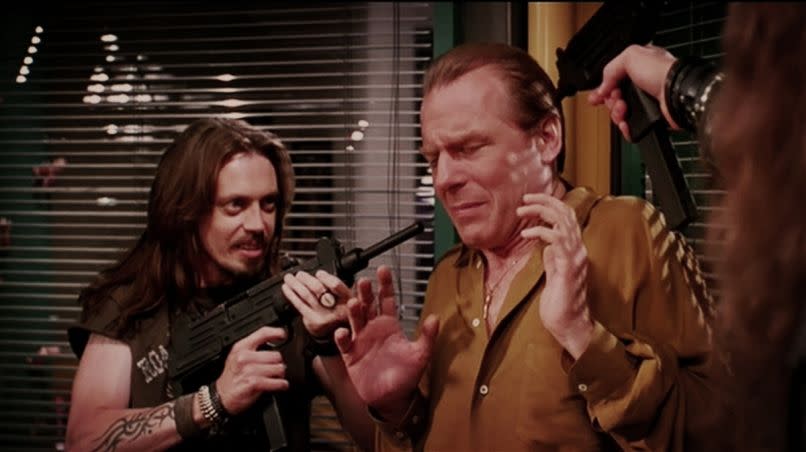
Airheads (20th Century Fox)
AMY LOCANE (“KAYLA”): I was put on tape in New York City, and then I happened to be in Los Angeles. I can’t remember what I was doing out there, but I happened to be out there for a weekend or something. I actually remember I asked [Michael], “Why did everything change when you saw me in person? Was the tape that bad?” And he was like, “No. For some reason I thought that maybe you were too sophisticated. And then I met you and I realized you weren’t.”
NINA SIEMASZKO (“SUZZIE”): One of the things that made [my casting] cool was that it was one of the times I came into an audition and the director said, “Listen, we want to work with you. We want you in the movie.” That was pretty cool. It was nice to be able to come into an experience and already know something good was going to come out of it.
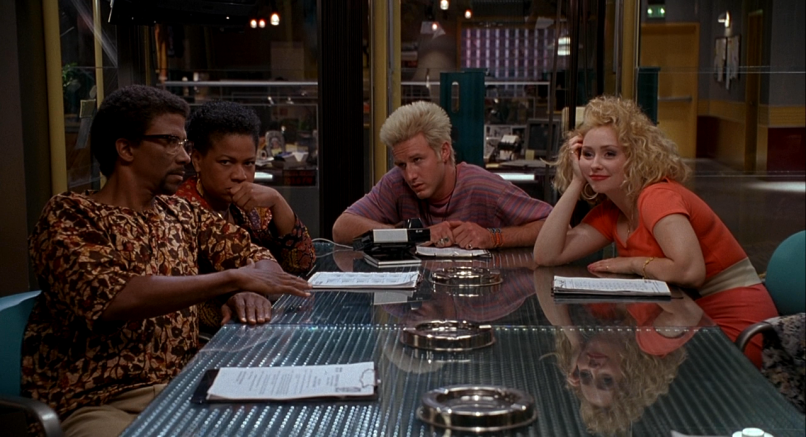
Airheads (20th Century Fox)
MICHELLE HURST (“YVONNE”): They were casting out of New York, and I was working at Lincoln Center Theater as a receptionist. And in the building the casting people were Billy Hopkins and Company. And I saw Billy almost every day and I would jokingly, but seriously, say, “When are you going to put me in a movie?”
So one day he said, “There’s this movie I’m doing. I want you to come down and read for this one character. She’s like an end-of-the-movie kind of character.” And I was like, “Fine,” fully knowing I was not going to be cast in it, and said “Where are you shooting?” And he said, “L.A.” I said, “You guys aren’t going to cast me. That’s crazy.”
So you don’t get nervous about those kind of auditions. You just go. And all of a sudden, a couple days later, Billy says, “Do you wanna go to L.A.?” I said, “What’re you talking about?” “The director liked you and he wants to put you in the movie.”
Degenerated: An Oral History of Airheads
Michael Roffman
Popular Posts

